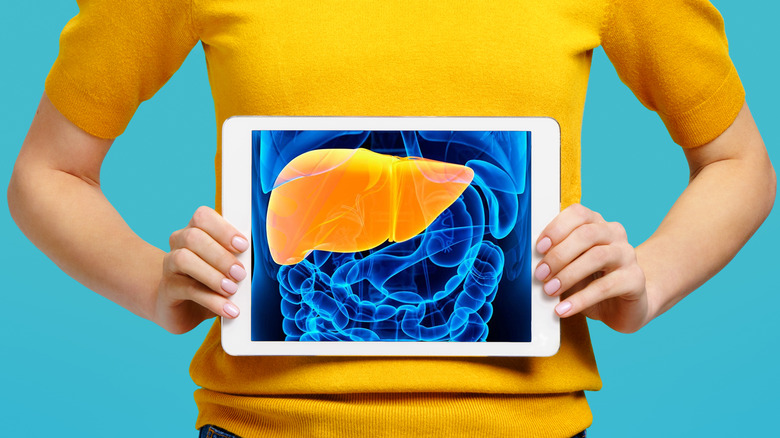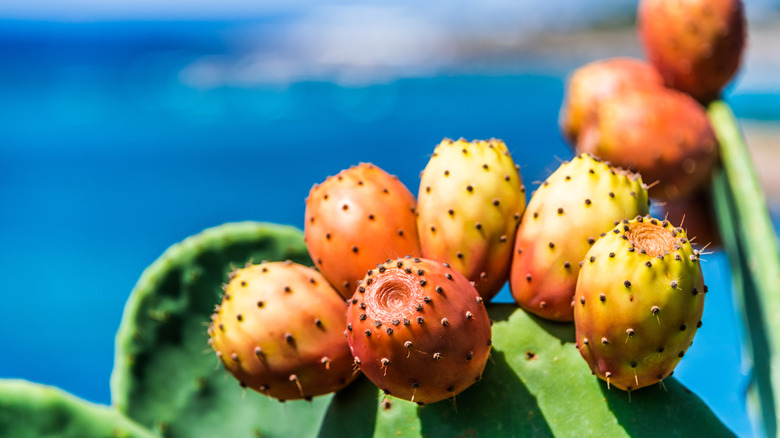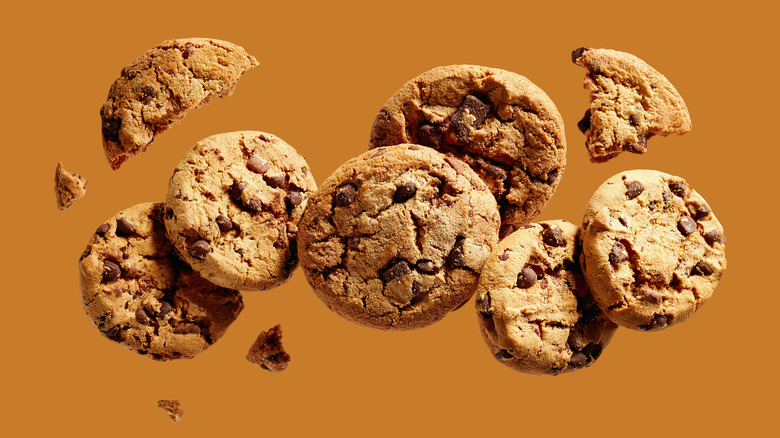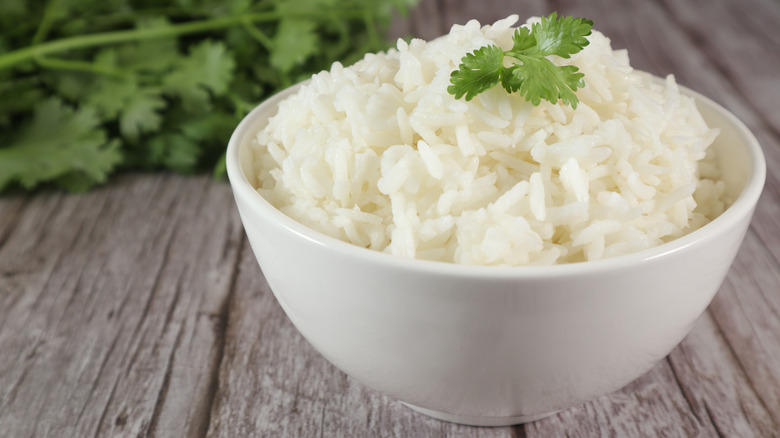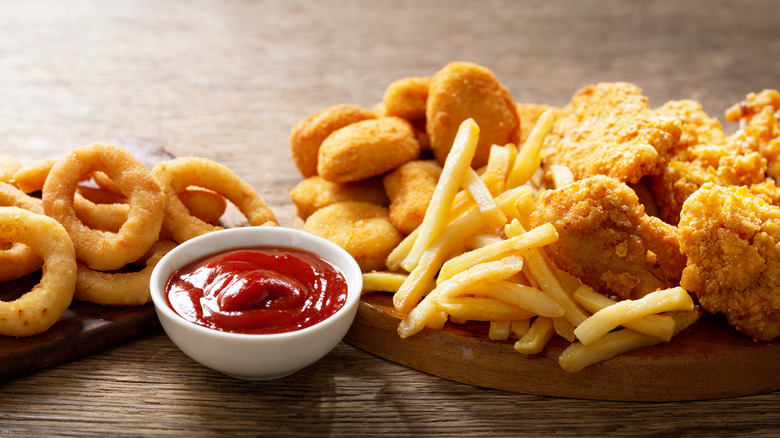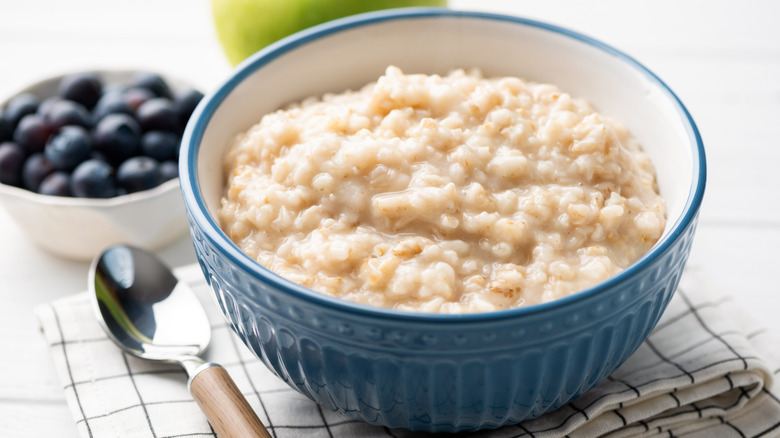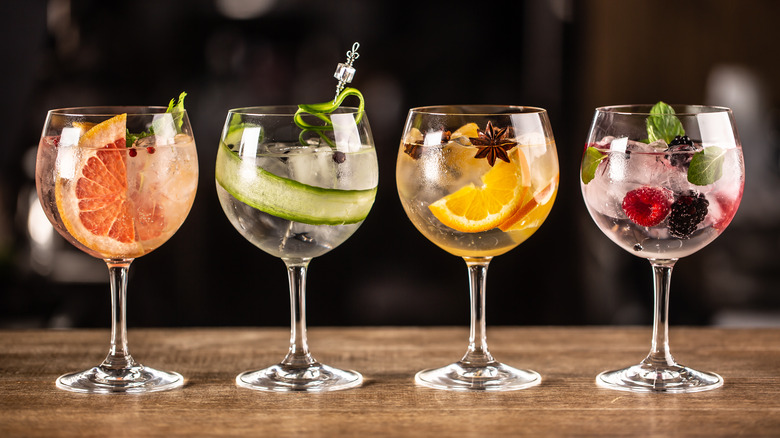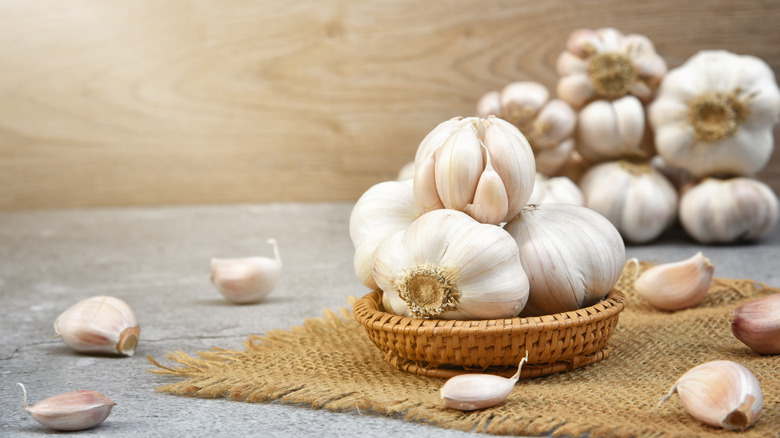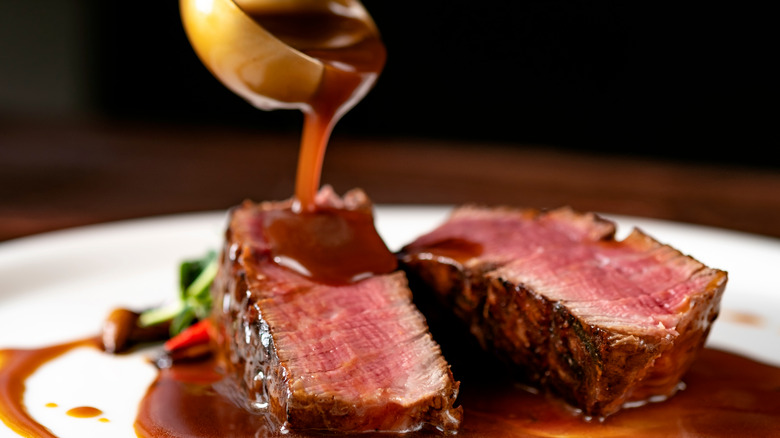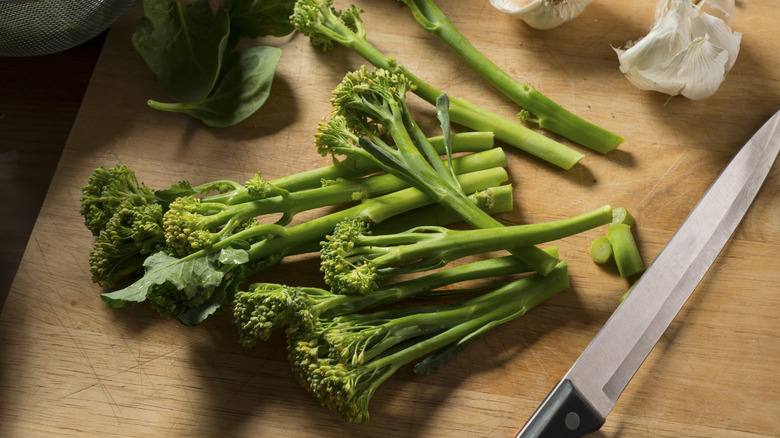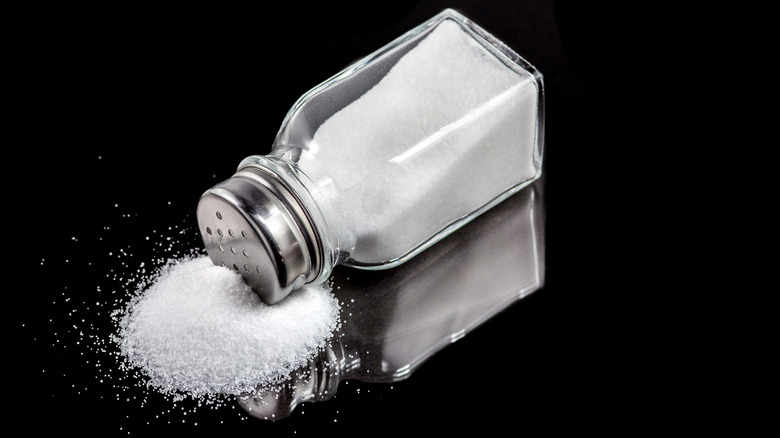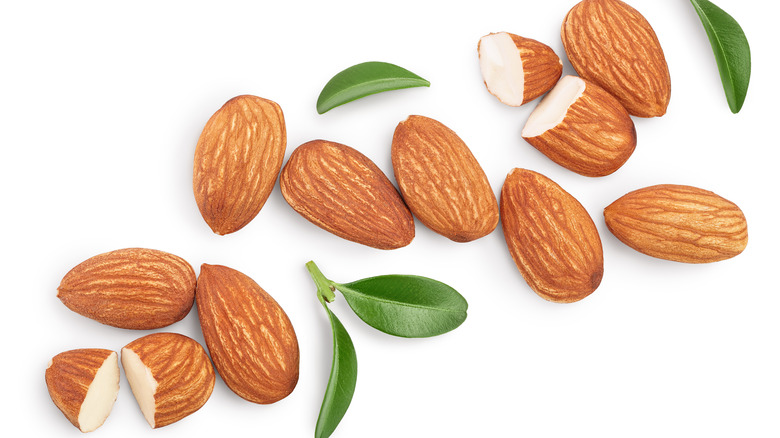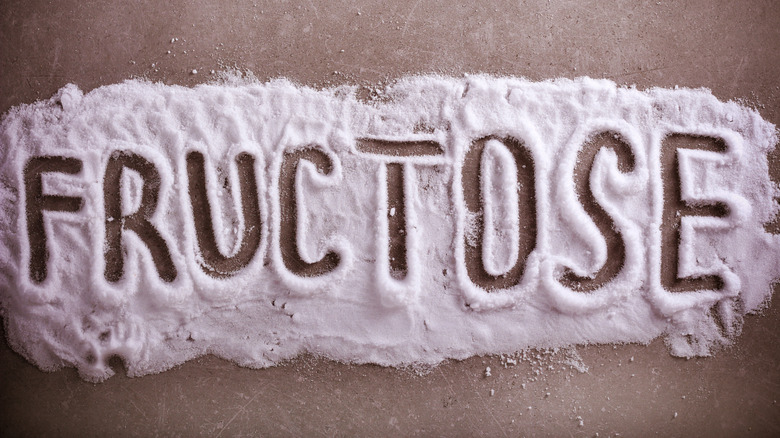7 Foods To Eat And 7 To Avoid For Your Liver
If your liver had a to-do list, it would be more than 500 items long (via Johns Hopkins). No, that's a not a typo. That cone-shaped, roughly three-pound organ is one of the hardest working parts of your body. And by far one of its most important functions is also why it can be susceptible to problems, depending in large part on your diet.
As Johns Hopkins explains, your liver helps to keep your body free of toxins and other potentially harmful substances. It does this by either changing these substances into something safe or removing them entirely from the bloodstream. This means your liver is constantly taking in bacteria, drugs, ammonia, and fats all to keep your body functioning properly. However, everything has its limits, and your liver is no exception. Eating certain foods especially in large amounts can overtax this vital organ. And just like how you're less likely to get to every item on your to-do list if you're not feeling well, your liver cannot function normally if it's pushed past a certain point.
Fortunately, there is some good news. Just as there are foods that can be rough on your liver, there are also ones that support its health. Of course, this doesn't mean gorging on any one type of food, but in the right portions and with your health care professional's supervision, they might be just what you need to keep your liver strong and healthy.
Try: Prickly pears
Unlike the types of pears you would normally use in a poached pears recipe, prickly pears are actually a type of edible cactus (via Healthline). Not exactly a shocker (just look at those needles), but what might be surprising is that they're a go-to remedy for several ailments, including exhaustion, lacerations, ulcers, and, yes, liver disease.
As Healthline points out, there have been several studies that support prickly pears as a good choice for a liver-friendly diet. In one, the researchers found that when rats consumed alcohol and then prickly pear juice, the juice helped reduce the amount of damaged the alcohol did on the rats' livers (via Healthline and National Library of Medicine). In another study, mice were given a combination of pesticide and prickly pear extract (via Healthline and National Library of Medicine). Why? It was to see if the extract could counteract the impact of this particular type of pesticide on the liver. Fortunately for the mice, it did.
Okay, but what about humans and prickly pears? Well, according to Healthline and the National Library of Medicine, a study involving 55 human participants found that prickly pear extract helped lessen their hangovers. Nevertheless, adding prickly pears in any form to your diet is not an excuse to overindulge on alcohol. And before changing your diet, you should always speak with your health care professional, especially if you have a condition like liver disease.
Avoid: Baked goods
For many of us, sweet treats like cookies and donuts are the ultimate comfort foods. Even a slice of bread smothered in jam with a cup of tea can help take the edge off a rough day. But unfortunately, these tasty treats are not part of a liver-healthy diet.
As WebMD explains, foods that contain trans fats can make it harder to maintain a healthy weight, which can take its toll on your liver. Now, if you're not exactly sure what trans fats are, trans fats occur when oil is turned from a liquid into a solid (via MedlinePlus). And be careful because "partially hydrogenated" is code for a food product containing trans fats. But wait, there's still more bad news. Margarine and shortening, both of which are commonly used in baked goods, are notorious forms of trans fats, meaning even if you're making a cake from scratch, you could still be using liver-hurting ingredients.
Besides obvious baked good culprits like cookies, donuts, breads, and cakes, trans fats are also found in biscuits, sweet rolls, pies (especially the pie's crust), and crackers (via MedlinePlus). Even cake mixes can contain trans fats, and that's before you add any other ingredients like margarine. And one more important note: Baked goods often contain sugar and salt, which are also bad for your liver (via American Liver Foundation).
Try: Coffee
For many of us, the day doesn't begin before that first cup of Joe. And while drinking too much of this popular beverage can potentially be bad for your health, the University of Chicago Medicine states on its website that you should consume as much as three cups of coffee daily, especially if you have liver fatty disease. Yes, you read that right: three cups of coffee every single day.
The article, which was written by registered dietitian Annie Guinane, explains that roughly 100 million Americans have fatty liver disease. Specifically, non-alcoholic fatty liver disease occurs when too much fat accumulates in the liver (via Healthline). This can progress to cancer and cirrhosis where the liver becomes scarred (via University of Chicago and Mayo Clinic). And while Guinane recommends other changes to one's diet to help reverse the effects of fatty liver disease before they have a chance to progress, coffee is nevertheless an important part of her recommended liver-healthy lifestyle.
Specifically, drinking coffee might help to keep the liver more elastic, a trait the organ loses once it becomes saturated with fat (via University of Chicago). Why coffee has this affect is still being researched (although caffeine could be a factor), however, Guinane does recommend drinking drip-filtered, black coffee over frappes, lattes, and macchiatos. She also says adding cinnamon or nutmeg to coffee is not the best way to have it but better than adding sugar.
Avoid: White rice
White rice is a pretty common kitchen staple, even being at the center of a viral Tiktok video. But if you're worried about your liver, then you might want to choose a different grain for your next meal. As Dr. Mark Babyatsky, the chairman of the Samuel L. Bronfman Department of Medicine at Mount Sinai School of Medicine in New York, told Everyday Health, white rice is a type of refined carbohydrate. And if you think all carbs are the same, think again.
As Dr. Babyatsky explains in Everyday Health, refined carbs like white rice are more likely to contribute to a fatty liver than their cousins: complex carbs. And the odd twist in this story is that both types of carbs come from the same place. It's how they're processed that makes all the difference. According to registered dietitian Tara Gidus Collingwood, when a grain like rice is milled, it no longer has germ and bran (via U.S. News & World Report). "This means that many B vitamins, fiber, protein, minerals and healthy fats are removed ..."
Not only is white rice missing key nutrients, but our bodies break it down faster than complex carbs, which have not been stripped of their bran and germ (via U.S. News & World Report). This can lead to fast increases in your blood sugar levels and difficulty maintaining a healthy weight, which over time can be taxing on your liver.
Try: Sunflower seeds
No, NAFLD isn't a new trending text. It actually stands for non-alcoholic fatty liver disease and, according to Healthline, occurs when too much fat accumulates in the liver. Eventually, NAFLD can lead to liver failure, so maintaining a healthy lifestyle, including eating liver-supporting foods, is essential for your overall health. Fortunately, adding sunflowers in the right portions to your meals and snacks might help with NAFLD.
The secret to sunflower seeds' potential positive impact on your liver is that these little seeds are packed with vitamin E. In fact, according to Healthline and the FDA, there are around 20 milligrams of vitamin E in a 100-gram serving of sunflower seeds. But there is a little fine print to be aware of before you run out to the supermarket or log into your go-to grocery website.
While there has been research on the impact of vitamin E on the liver and in particular livers with NAFLD, these studies focused on vitamin E supplements (via Healthline). Also, as Healthline notes, eating too many sunflower seeds does have its drawbacks. For example, sunflower seeds can increase your calorie intake, and not maintaining a healthy weight can lead to a host of health problems, including NAFLD. They're also rich in selenium, which can have its benefits, but can also become more harmful than helpful in large amounts. Bottom line: If you want to add sunflower seeds to your diet, make sure to portion control how many you eat daily.
Avoid: Fried foods
Okay, let's be honest, fried foods usually don't make anyone's healthy list. Of course, that doesn't dampen their popularity, but the fact remains they aren't put in the same category as broiled, grilled, and even some baked cuisines. However, not only are these fried foods potentially bad for your liver's health, but their impact can also occur faster than you might realize.
Dr. Drew Ordon of "The Doctors" talked with CBS News about a study that showed how fried foods commonly found in fast food restaurants can not only hurt the liver but can cause "significant changes" to the liver after just one month. Now to be fair, the study focused on eating large amounts of these foods. But as Dr. Ordon notes, "... so many people are getting into eating fast food, especially kids, as their staple ..." And what are some of the biggest culprits according to this study? Unfortunately, the list included such favorites as onion rings, fried chicken, and french fries (which were ranked as one of the worst fried foods for your liver).
Okay, but just how bad could fried foods really be? Well, according to Dr. Ordon, the way large amounts of fried foods affect the enzymes in the liver is comparable to how those enzymes are affected in someone who has hepatitis (via CBS News). And don't forget, hepatitis in all of its forms can cause liver damage and in some cases liver failure (via Mayo Clinic).
Try: Oatmeal
By now, we've all heard how fiber can be beneficial to one's health. However, which fiber you pick can make a difference, especially when you're trying to keep your liver healthy. But the good news is oatmeal is packed with a fiber that has been shown to be beneficial for the liver.
As Medical News Today explains, oatmeal and for that matter oats are rich with beta-glucans, a compound that research has found might help keep your liver from becoming saturated with fat. Now to be fair, the study in question was on mice, not humans, but the evidence is promising. In fact, the National Center for Biotechnology Information states that beta-glucans are potentially beneficial in helping individuals maintain a healthy weight and control blood sugar fluctuations both of which can be rough on the liver.
Beyond oats containing beta-glucans, just the fact that they're whole grains can support good digestive health, as well as make you feel fuller longer (via Medical News Today and the British Journal of Nutrition). But one important note: Even though instant oatmeal is convenient, it isn't always as healthy as steel-cut oats or whole oats. In particular, be careful of added sugars, which can be very bad for your liver's overall health (via American Liver Foundation). Also, pay attention to what you add to your oatmeal. The wrong toppings can take a healthy meal and turn it into something potentially damaging for your liver.
Avoid: Alcohol
This next item is not a surprise, but while it's widely known that alcohol can damage the liver, the exact reason why might not be as obvious. You see, one of your liver's many functions is breaking down alcohol, changing it into carbon dioxide and water (via Cleveland Clinic). By doing so, your body can get rid of the alcohol before it has a chance to do any major harm. Unfortunately, your liver does have its limits, and this is where problems can begin.
If you consume too much alcohol, your liver will, of course, try to break it down as normal but can become overwhelmed, allowing the alcohol to remain as a harmful substance in your body (via Cleveland Clinic). Once this happens, the alcohol can hurt every part of you, including your liver. Specifically, the alcohol can interfere with another job your liver does: breaking down fats. As a result, you can develop a condition known as fatty liver which can lead to cirrhosis, a condition where the liver develops scarring (via Cleveland Clinic and Mayo Clinic).
While all of this is concerning, what's truly scary is consuming more than one and a half ounces of alcohol on a daily basis can lead to fatty liver (via Cleveland Clinic). And while you can heal from fatty liver disease, a scarred liver will remain damaged and might eventually stop functioning. In addition, excessive drinking can take its toll on other areas of your body like your heart.
Try: Garlic
No, garlic will never make Dracula's list of healthy ingredients (although the vampires in the "Twilight" series didn't seem to mind it). But you should definitely consider this pungent herb for your short list if you have concerns about your liver.
You see, your liver helps to keep your body free of possibly harmful substances by producing enzymes that removes toxins from your bloodstream (via Livestrong and Fisher-Titus Medical Center). And as luck would have it, garlic really gets those enzymes going, meaning it could help your liver clean more toxins out of your blood. But that's not all. According to the Fisher-Titus Medical Center, garlic is a good source of a mineral called selenium, which is beneficial because it helps keep your liver from being overwhelmed by toxins. After all, since one of your liver's main jobs is dealing with these harmful substances, it's only natural that it needs to detox every now and then to continue to function normally.
Although garlic can be very beneficial, there still are some cautions surrounding this herb. Remember, garlic contains selenium, and like many nutrients, too much selenium can lead to health issues, so you should speak with your health care professional about how much garlic is safe to add to your diet. In fact, it is possible they will advise against garlic or at least garlic supplements (via Livestrong). Why? Well, one reason is garlic can interfere with some medications like blood thinners (via Harvard).
Avoid: Red meat
Usually, when we hear about the possible health issues associated with red meat, the focus is on the heart and the circulatory system. However, a study published in the Journal of Hepatology has found that eating large amounts of red meat on a regular basis can raise the odds of developing non-alcoholic fatty liver disease (NAFLD) by roughly 50% (via Chicago Tribune).
Remember, NAFLD is when too much fat accumulates in the liver, which if not addressed, can permanently damage it over time. And that's not the only liver concern an 800-participant study by the U.S. National Institute of Diabetes and Digestive Kidney Diseases found (via Chicago Tribune). As the study's researchers noted, consuming red meat can also make you more likely to develop insulin resistance where your body no longer uses the insulin it makes properly. This condition can not only lead to Type 2 diabetes but also can increase the chances of developing NAFLD.
Now, to be fair, the researchers have said that their findings "didn't prove cause-and-effect" regarding a red meat diet's potential impact on the liver (via Chicago Tribune). It will take more research before that's a possibility. With that said, if you have liver concerns, you might want to cut back on the amount of red meat you consume. And one more note: The study also found processed meats were just as taxing on their participants' livers, so you might want to eliminate products like bacon from your diet as well.
Try: Broccoli
Poor broccoli. This vegetable is rejected so often, that it became a plot point for the Pixar movie "Inside Out" (although not in every version of the film). But even if broccoli isn't your favorite veggie, you might want to give it another chance.
According to a study published in the Journal of Nutrition, eating broccoli might not only help with non-alcoholic fatty liver diseases or NAFLD but also might be beneficial for someone with liver cancer (via Medical News Today). The research, which involved four groups of mice who were all fed different diets, was designed to specifically test broccoli's impact on liver cancer as opposed to cancers in general. When the mouse group being fed the Western diet (which is high in fat and sugar) began eating broccoli, the number of cancer nodules (growths) in their livers dropped (although the size of the remaining nodules did not change).
So, why did broccoli have this effect on the mice's livers? Well, the person who led the study, Prof. Elizabeth Jeffery at the University of Illinois, said she and her colleagues had conducted previous research into the health benefits of broccoli and found that it contains a compound that can help prevent cancer from developing in your body (via Medical News Today). Plus, data has found that brassica vegetables like broccoli might help prevent too much fat from building up in your liver, reducing your chances of developing NAFLD.
Avoid: Foods high in salt
There's no denying the human body needs a certain amount of sodium to function, but how much salt does an adult need to take in daily to stay healthy? According to the U.S. government and the American Chemical Society (ACS), the answer is a measly teaspoon. Now, it's doubtful anyone would want to swallow an actual teaspoon of salt, but if you start looking at nutrition labels, you might be surprised how much salt you're consuming daily. And, yes, a little bit of salt here and there might eventually lead to liver problems not just for adults but also for the unborn.
A study in the ACS' Journal of Agricultural and Food Chemistry found that full grown mice who consumed large amounts of sodium experienced issues with their livers on the cellular level (via ACS). Specifically, they produced fewer liver cells, and the ones that they did make were abnormal in appearance and died more quickly. And the same thing occurred when the researchers increased the amount of salt that chick embryos came in contact with: changes to their livers' cells that could make them more prone to liver failure (via ACS and National Center for Biotechnology Information).
While the results of this study are concerning, the researchers also discovered a possible way to help counteract high sodium level's impact on the liver (via ACS). When they administered vitamin C to the mice and the chick embryos' cells, their livers' health improved.
Try: Almonds
These crunchy little nuts are not only great for a variety of dishes (including desserts) but also can be very beneficial for your overall health. And, yes, that most definitely includes your liver.
As the Manipal Hospitals' website explains, almonds can not only help your liver avoid becoming overly saturated with fat but also can help your liver with some of its tasks like managing your blood pressure and cholesterol. The secret behind why almonds are so good for your liver is they're an excellent source of unsaturated fats and vitamin E. Remember, not all fats are the same, and unsaturated fats can actually help support not only your liver but also your heart (via Harvard). In addition, almonds have calcium, so they're good for your bones and teeth (via WebMD).
But there is one caution to keep in mind before you start chowing down on almonds.
Although almonds can be part of a healthy diet, eating too many might make it more difficult to maintain a healthy weight, which can put a strain on your liver (via WebMD). For example, two dozen almonds have 180 calories. So, it's important to use portion control especially if you want to have them as a snack. This is definitely one food you don't want to mindlessly munch from a large bag or snack container while you watch TV.
Avoid: Sugar
Now just to be clear, this next section is about added sugars, which as Medical News Today and Comprehensive Reviews in Food Science and Food Safety explain, are sugars that do not naturally occur in certain foods. Instead, they're added to these foods during the manufacturing process. And, unfortunately, it doesn't take a large amount of this type of sugar to possibly hurt your liver.
A three-year study involving 94 men had the participants stop consuming all types of drinks that are sweetened using sugar for four weeks before the experiment began (via Medical News Today and Journal of Hepatology). The men, who ranged in age from 18 to 30, were divided into four groups. While one group continued to consume their beverages with no sugar, the other three drank either fructose (sugar found in fruits and honey), glucose (simple sugar found in cornstarch), or sucrose (table sugar) in their drinks three times daily (via Medical News Today, Journal of Hepatology, and Healthline). All three groups consumed 80 grams of their respective sugars every day.
Although three different groups of the study's participants drank sugar in their beverages, it was the fructose group that by far produced the most fat (via Medical News Today and Journal of Hepatology). And since fat can lead to non-alcoholic fatty liver disease, it's important to keep track of not just how much sugar you're consuming but also what kinds of sugar or sugars are in the foods you eat and drink.

